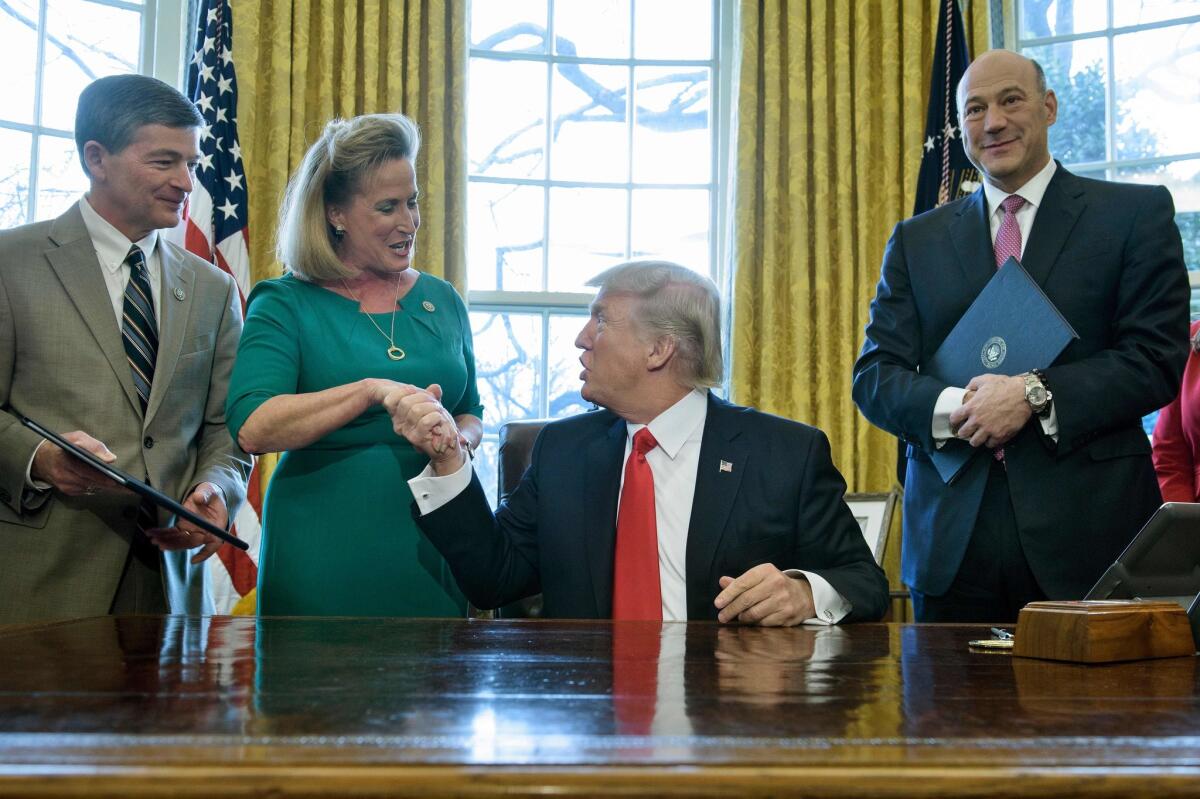Labor Department proposes delay of retirement advisor rule until June to conduct Trump-ordered review

- Share via
Reporting from Washington — The Labor Department on Wednesday proposed a 60-day delay in implementing a new rule for retirement advisors, set to take effect next month, to complete a review ordered by President Trump that likely will kill the controversial Obama-era measure.
Extra time is needed to collect and analyze data about the effects of the so-called fiduciary rule, which requires investment brokers who handle retirement funds to put their clients’ interests ahead of other factors, such as their own compensation or company profits, the Labor Department said.
The rule was scheduled to take effect April 10 but now would not be implemented until June 9. The delay is expected to be approved after a short public-comment period.
On Feb. 3, Trump ordered officials “to examine the fiduciary rule to determine whether it may adversely affect the ability of Americans to gain access to retirement information and financial advice,” the Labor Department said.
“What we are doing is we are returning to the American people, low- and middle-income investors and retirees, their control of their own retirement savings,” Trump said in signing the memo. “This is a big day, a big moment for Americans that care to invest and save.”
The order was part of a broader push by Trump to reduce federal regulations and roll back Obama administration initiatives. On the same day, Trump ordered the Treasury secretary to review the Dodd-Frank financial regulatory law with an eye toward dismantling it.
The fiduciary rule was designed to prevent consumers from being steered toward IRAs and other retirement investments with higher fees or lower returns that benefit the advisors recommending or selling them.
The Obama administration estimated such conflicts of interest cost Americans $17 billion a year.
But opponents, including key players in the financial industry and the U.S. Chamber of Commerce, said the rule would increase the cost of investments by forcing asset management firms to spend money on implementation and make it more difficult for average Americans to get retirement advice.
Congress voted last spring to overturn the rule, but Obama vetoed the measure.
On Wednesday, the Securities Industry and Financial Markets Assn,, which represents securities firms, banks and asset managers, said the pending rule already had caused some firms to announce they no longer would offer some products and make other changes that harm Americans’ access to retirement offerings.
“Delaying the rule is imperative to avoid further client confusion and market disruption, as firms approach the drop-dead date to notify tens of millions of customers of service changes to their accounts because of the rule, ultimately making retirement savings more difficult for many investors,” said Kenneth E. Bentsen Jr., the association’s president.
But Lisa Donner, executive director of Americans for Financial Reform, a coalition that supports tougher Wall Street regulations, said the delay was “clearly part of the administration’s plan” to scrap the rule.
“Blocking the common-sense, long-overdue rule, which requires retirement advisors to act in their customers’ best interests, would allow Wall Street to continue to grab more than $17 billion a year — tens of millions of dollars a day — from retiree savings,” she said. “This decision is not justified by the facts, and it is a betrayal of the public interest.”
The delay also allows time for Trump’s Labor secretary nominee, former Justice Department official R. Alexander Acosta, to be confirmed by the Senate. Acosta was nominated Feb. 16 after Trump’s first pick for the job, Southern California fast-food executive Andy Puzder, withdrew amid several controversies.
Trump ordered the Labor Department to determine whether the rule has harmed or was likely to harm investors by reducing access to retirement savings, has caused “dislocations or disruptions within the retirement services industry that may adversely affect investors or retirees” or was likely to cause an increase in litigation and the prices investors pay for retirement advice.
If the review finds any of those effects or concludes any other reason why the rule “may adversely affect the ability of Americans to gain access to retirement information and financial advice,” the Labor secretary must rescind it, Trump’s memo said.
Analysts expect the review to lead to the rule being scrapped.
“There is no question that the Trump Labor Department will find that the rule harms investors,” Jaret Seiberg, an analyst with brokerage and investment bank Cowen & Co., said when Trump ordered the review. “This is why our expectation remains that the Labor Department will propose a rule that rescinds the entire regulation.”
Follow @JimPuzzanghera on Twitter
ALSO
Consumer spending growth slows as rising inflation hits Americans’ purchasing power
FCC Chairman Pai wants to halt Internet privacy rules before they begin taking effect this week
Trump says businesses can’t borrow because of Dodd-Frank. The numbers tell another story
UPDATES:
10:20 a.m.: This article was udpated with comment from Lisa Donner of Americans for Financial Reform.
This article originally was published at 9 a.m.
More to Read
Inside the business of entertainment
The Wide Shot brings you news, analysis and insights on everything from streaming wars to production — and what it all means for the future.
You may occasionally receive promotional content from the Los Angeles Times.











